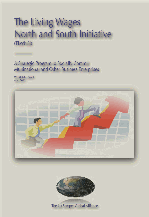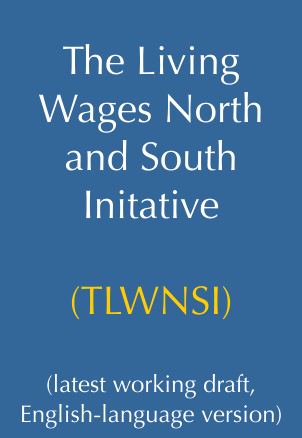TLWNSI - A Strategic Program to Socially Commit the Private Sector
Introduction
Globalisation, as its pundits define it, is a process by which the economic theory of Neoliberalism, where everything relies on the forces of free trade and open markets (by now completely discredited by its own systemic crises), produces the most efficient distribution of resources and, thus, achieves the greatest level of welfare. However, its goal of achieving maximum efficiency in profit generation is in direct opposition to the goal of achieving social justice. This is a great conflict of interests. We cannot reduce to mere formulas the fate of hundreds of millions of people who become subjects of visions based on a set of morals that uphold the accumulation of wealth as its central value. These visions disregard the need for human solidarity and claim that the right way is for individuals to look each one, individually, for his or her own sake. But this argument opens the way for corporations to achieve maximum efficiency by securing the cheapest cost of labour in the world through exploitation. This is the real motivation behind the pressure of the economic powers for the opening of Third-World markets, for they achieve maximum efficiency at the expense of social justice.
Ethical Framework of Reference
How does Neoliberal Exploitation Occur? Through the zero-sum game= the benefit of the few at the expense of the many. » There is a double standard for the market economy: - Globalisation of consumer and labour markets
- Globalisation of prices
- Anti-globalisation of labour endowments
- Third-World worker earns, on average, <=10% of cost of First-World worker
- Handling of workers as commodities, at speculative and volatile labour costs
- Supply is globalised while demand is not because no aggregate demand is generated
- Hunger wages from multinationals (MNCs) are typically the best wages and become the benchmark for wages paid domestically in each economy
- Competition for foreign investment triggers a permanent trend in the South to depress labour endowments
- Foreign investment benefits predominantly Southern elites
- The odds to generate aggregate demand and sustain growth are cancelled
This ethos has created a tremendous wage gap between North and South as the example in Table 1 reflects. (see Labour Data for further details).
TOP
What are the living wage and fair compensation criteria?
- No fair compensation without living wages even with compliance of the International Labour Organisation (ILO) Conventions
- Same access to material goods as in the North: Benchmark = material quality of life of equivalent workers in the North
- Defined by equalizing wages in terms of purchasing power parities (PPPs)
A Living Wage is a Human Right Societies cannot be viable in a global system, unless individuals have the right to live a dignified life through the use of their abilities, by earning the means to uphold this right above all social and political considerations.
The Concept of Fair Compensation A living wage is the real wage that provides workers in the South with the same ability to fulfil their needs, in terms of food, housing, clothing, healthcare, education, transportation, savings and even leisure, as that enjoyed by equivalent workers in the North. We define this in terms of the purchase power parities (PPPs)* used by institutions such as the World Bank. In this way, by incorporating the cost of living -through PPPs- into the concept, Third World workers would be compensated in an equivalent way to that of First World workers and, thus, enjoy an equivalent quality of life, as illustrated in the example in Table 2 in the case of North America and Brazil. (Please refer to the Economic Data page of our Resources section for detailed information about Purchasing Power Parities). *According to the World Bank's World Development Indicators: The number of units of a country's currency required to buy the same amounts of goods and services in the domestic market as $1 would buy in the United States.
TOP
Core Objectives
- Make a strategic contribution to the gradual closing of the North-South wage gap, by gradually equalising wages of workers with equivalent jobs through an internationally recognised and practical mechanism;
- Disseminate our living wage concept striving to establish it as the core standard of business practice;
- Generate upward pressure on labour costs on South’s formal /informal sectors, in order to raise the benchmark for labour endowments until placed at par –in real terms– with the North’s labour endowments;
- Contribute to embed in business culture the true concept of corporate sustainability by transforming the purpose of business to make it fully compatible with the people and planet paradigm in the context of a true democracy ethos.
Uniqueness of concept
Since the beginning of the 1990s, a growing interest among NGOs is building up to stop MNCs from continuing to pursue a strategy of investing in developing countries centred on the availability of cheap labour and the “discretionary” application of legislation –when available– for labour and environmental protection. However, TLWNSI is the first concept to specifically focus on the living-wage gap by setting as its underpinning goal to close the real wage gap between North and South workers of MNCs, performing the exact same job or an equivalent to the one performed in the MNCs’ operations in their home country. Following are its most distinctive attributes: - Directly addresses living-wage gap: TLWNSI uniqueness resides not on the fact that its central mission is addressing this living wage gap, but succinctly, that it addresses it. In other words, TLWNSI is the only initiative that directly and explicitly addresses the absence of a living wage standard in both multi-stakeholder and multilateral so-called corporate responsibility guidelines, standards, norms or principles.
- Directly denounces the issue of labour exploitation as a corporate best practice. Its living wage concept fundamentally denounces the issue of labour exploitation customary practiced by both foreign and domestic business in the Southern countries with the full support of host governments.
- Upholds the principle of equal pay for equal work as an indefeasible human right. No initiative is anchored on the principal of economic remuneration equality as a universally upheld principle.
- Provides a practical mechanism to define what should be a living wage for a specific job in a specific company and a specific country.
TLWNSI poses a fundamental question: why should workers in the South receive a lower wage standard than their counterparts in the North for equal work of equal market value? Many argue that it is a matter of supply and demand, but suffice it to say that market-driven economic logic cannot be above the fulfilment of a human right in the context of a true democracy ethos. Therefore, a living wage for Southern workers must be the same –in terms of purchasing power– as the wages of the northern counterparts. TOP
TLWNSI's Proposal
Equalise wages in a maximum of 30 Years, by using the influence of sustainability sensitive investors and consumers as key leverage mechanism in true sustainability program.
Strategic Concept
The strategic concept is anchored on unrelenting advocacy activity aimed at MNCs and key stakeholders in support of dignified compensations in the MNCs Southern operations –using their domestic compensation arrangement as the point of reference and the argumentation previously noted– as part of a paradigmatic change in the understanding of the purpose of business entities. To materialise our strategy, several actions with a broader reach and a comprehensive approach are executed on a permanent basis:
- Continue advocacy of TLWNSI’S gradual closing of the wage gap over a period of not more than thirty years.
- Continue work with citizen networks involved in modifying business practices from a human rights perspective.
- Continue work with citizen networks involved in improving existing multilateral standards for business sustainability.
- Promote change of business’ raison d’être to incorporate the sustainability of people and planet at the core (DNA) of corporate culture –deep in their corporate governance, strategy and operations.
- Work with the vanguard of sustainability practitioners to lift the bar dramatically for true sustainable social and environmental business practice.
- Involve key stakeholders –carrying the necessary leverage to make companies redesign their core (DNA) business nature– into a push for paradigmatic change.
Fundamental players to prompt the paradigmatic change
Parting from the premise that the world is currently controlled by an oligarchic alliance between the owners of the Darwinian capitalist market and their partners in control of states who jointly and coordinately strive to maintain the status quo, TWLNSI envisions three key players that have the leverage to exert change and, eventually, our departure from the current ethos and our move towards the construction of the people and planet paradigm. Two actors, financial investors and consumers, interact within the logic of the market. The third actor is all citizens mobilising to replace mock democracy with the true democracy ethos.
The Cost of Investor and Consumer Alienation for an MNC
- Market share: Losing less than one point market share is far more costly than gradually paying living wages as described in the example in Table 3 Once consumers have been alienated, one year of lost business, representing a loss of less than one percent of global markets share (0.75%), would be clearly more expensive than the entire investment cost -in thirty years- of very gradually equalising wages in PPPs terms at current market prices.
- Shareholder value: Consequently, a loss in market share will almost invariable negatively affect shareholder value, the overriding goal of any for-profit organisation. This in turn will trigger a shareholder backlash, particularly among socially-responsible and sustaianbility-sensistive investors.
TOP
The Benefits for Workers Short term: - South: A less unfair compensation
- North: A reduction in the pace of transfer of jobs to the South and a release of downward pressure on wages
Long term:
- A gradual equalisation in total compensation in the South, over a reasonable period of time, relative to the standard of living of workers in the North. The complete disappearance of job loss due to labour comparative advantages in the South.
- The result is the generation, both in the North and South, of many new jobs due to a sustained growth of aggregate demand as a result of wealth re-distribution through wage equalisation and the transition towards a people and planet paradigm.
The Benefits for Corporations and Shareholders
- Short-term: a positive endorsement of their actions before their target markets (key stakeholders);
- Long-term: an expanded, stronger and far more sustainable global market with many more consumers, a global middle class;
- A far stronger direct market of sustainability conscientious consumers and investors –or corporations embarking in the people and planet paradigmatic change–guaranteeing sustained growth for their shareholder value.
The Benefits for Consumers - A much stronger and far more stable global economy with all its inherent benefits;
- A well-informed consumer awareness ethos of the companies that are socially responsible and of those refusing to cooperate, so that consumers can exercise their right of choice and vote their conscious in their consumer preferences within the context of a transition towards a people and planet paradigm.
TOP
The Benefits for Governments
Home countries: Trade and investment take a sustainable increase as most growth is anchored on the true brick and mortar economic activity and much less in the bubble economy of financial markets’ speculations. Global public and private debts decrease and are put under control as individual real economies take off with a sustainable path, tax revenues increase and inflation and interest rates decrease. Welfare State systems are revamped to remain under direct and firm public control and provide a higher and sustainable quality of living standard to their societies. Tangible results in social justice empower governments to democratically remain in power –under a true democracy ethos in transition towards the people and planet paradigm– instead of through financial support from private and unsustainable interests;
Host countries: Their social responsibilities are increasingly fulfilled, dramatically reducing the gap between rich and poor and with the middle class taking the central focus. Millions formerly excluded from enjoying a dignified quality of life are now included, generating a clear decrease in a wide array of social problems. The real economy takes off at a sustainable pace, and as tax revenue increases and inflation and domestic interest rates decrease, domestic and foreign debts are reduced substantially. Welfare State systems are revamped or created for the first time in many countries, to be managed under direct and firm public control to provide dignified and sustainable quality of life standards to their societies. Tangible results in social justice empower governments to democratically remain in power –under a true democracy ethos in transition towards the people and planet paradigm– instead of financial support from private and unsustainable interests.
The Benefits for Civil Society at large
- A far more sustainable and much less unfair and yet diverse truly democratic Global Civil Society at large;
- A truly beneficial shift to a new understanding of our role as citizens in a true democracy ethos, where we all have both indivisible rights and responsibilities to play our part in the building and sustainability of a people and planet paradigm. This new truly democratic and sustainability culture allows us to enjoy a far more sustainable quality of life standard as long as we fulfil our individual responsibilities to the people and planet paradigm;
- A permanent, direct and bottom-up true democracy ethos with governments accountable exclusively to their people;
- A better world
TOP
Investors' sensitivity momentum
Sustainability investors regard unsustainable companies as investment risks!
Although the criteria and specific standards used by so-called "socially-responsible investors" are not by any means comprehensive nor homogenous, the concept of socially-responsible investment, anchored on the ethical dimension of investments, is growing and expanding beyond the traditional SRI community. Today, an impressive array of investors is now perceiving the environmental, social and governance dimensions as sustainability investment risks. Investors are in increasing need of information to determine which companies and brands are most at risk of losing shareholder value, whether because of negative environmental footprints, denunciation of corporate malpractice through NGOs’ campaigns or bad sustainability performance assessments by consumer organisations, among others. In this way, the need of investors to reduce investment risk based on the perceived multidimensional sustainability performance of companies is giving them enormous leverage to curve the ESG performance of companies. Investors are in the driver’s seat of business practice through their investment decisions, not because they operate within the logic of the market, but because they actually dictate the logic of the market that can make or break many key corporate decisions.
Consumers' sensitivity momentum
Consumers are increasingly more sensitive to the behaviour of MNCs Growing Consumer Social Sensibility - 70% of European consumers say that knowing the social and environmental responsibility of corporations is important or very important (25%) when deciding which product or service to buy. (Corporate Social Responsibility Europe (MORI Sep/2000))
- 44% of Europeans would be willing to pay more for a product or service from a socially responsible corporation vs. 37% who would not do it. (Corporate Social Responsibility Europe (MORI Sep/2000))
- 38% think that responsible corporations must be required to report while 41% think it should be voluntary. (CSR Europe (MORI Sep/2000))
- Globally, 25% think that the best way to enforce CSR is to inform consumers so that they choose from which companies to buy. (World Economic Forum survey, Nov-Dec 2001)
Civil society's sensitivity momentum
Global Civil Society Demands Control of MNCs! The citizenry wants an active role of governments and consumers to apply checks and balances to MNCs*: - Fully two-thirds of citizens across 25 countries agree that the free market economy works best in society's interest when accompanied by strong government regulations.
- Almost 50% chose as the most effective approach to increase the social responsibility of MNCs either national or international laws.
- Almost 80% want global corporations to not only cover basic medical attention for their workers, but also to extend these benefits for all residents in poor communities where they operate.
*World Economic Forum survey, Nov-Dec 2001 TOP
Conclusions
TLWNSI is the practical culmination of our effort to contribute to the global drive to change from the current marketocracy paradigm, for shareholder value, to the true democracy paradigm, for the long-term sustainability of the people and the planet. Our experience has shown us that the staunch opposition of the vast majority of governments and the market –despite the recurring crises of their system and the overwhelming evidence of its societal and environmental unsustainability– will eventually collapse for the simple reason that their paradigm is physically unsustainable. Hence, we must work to ensure that we transition into a new ethos, where the welfare of people and the long-term sustainability of Mother Nature is the only purpose of societies across the world. This is where our living wage initiative will contribute to make the right to decent work, worthy of human dignity, a core element of true democracy and the standard customarily honoured by both governments and market players.
To get a detailed description of The Living Wages North and South Initiative, download our latest working draft by clicking its icon in the upper right column, or go directly to the working draft service page to download a Spanish-language version: "La Iniciativa Salarios Dignos Norte y Sur" (LISDINYS) Go to working draft.
TOP |







